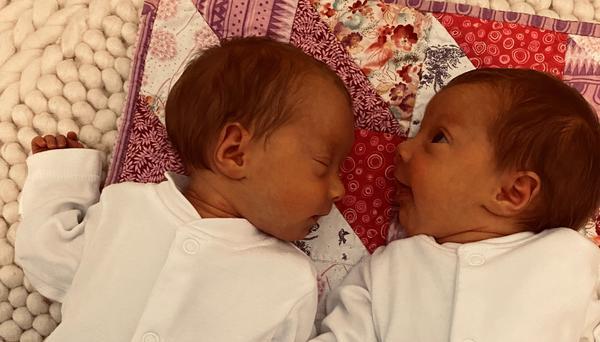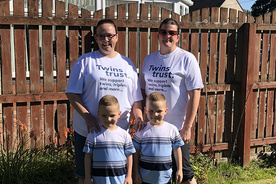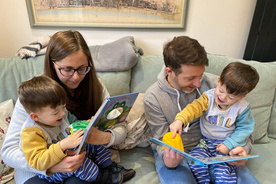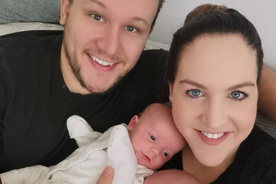3rd March 2021
An extremely rare complication of having identical twins known as TAPS (Twin Anaemia Polycythaemia Sequence) led to Hanna Richford having two life-saving surgeries on her babies in the womb.
Hanna became pregnant with twins through IVF when her embryo split. “I always had a suspicion I was carrying twins because right from the start I was extremely sick.

So, at the early six weeks scan I was not surprised to hear two heartbeats, but my husband’s jaw certainly dropped!
Hanna’s pregnancy was uneventful until the 20-week scan in July at Frimley Park Hospital in Surrey.
“I’d had scans at 16 and 18 weeks and there was no sign of any problems, but I’d just recently felt my tummy get tighter so in a way at the 20-week scan I was wondering if something was going on.”
But Hanna wasn’t prepared for the news that followed. She was diagnosed with Stage 3 TTTS (Twin to Twin Transfusion Syndrome) and told to get to St George’s Hospital in London (home of the Twins Trust Centre for Research and Clinical Excellence) straight away.
“Hearing this news alone was upsetting (as Covid restrictions were in place at the time) but I am quite a practical person and just got on the phone to my husband, told him what was happening and within no time we were driving to St George’s.
I allowed myself to have a little cry in the car because I knew it was serious, I had read up on TTTS. But when we got there, we were immediately put at ease by Asma and her team.
TTTS is a rare but life-threatening condition that affects around 15% of identical twins that share a placenta. Professor Asma Khalil carried out laser surgery in the womb which seals blood vessels to control blood flow.
With Covid visiting restrictions lifted the day before, Hanna’s husband James was able to be there.
The couple then endured an agonising wait to make sure the surgery was a success, and that the twins were safe and growing well.
But a week later, back at St George’s, Hanna was diagnosed with TAPS.
This is an extremely rare complication that again is specific to monochorionic (identical) twins. It’s where one twin becomes very anaemic (low blood level) and the other polycythaemic (high blood level). It can occur on its own or after laser treatment for TTTS, which is what happened here.
“This was something we were not expecting to hear. Asma has only seen this in a small number of twins, approximately 25 cases. We were lucky it was picked up at St George’s and were able to have it treated as it is not routinely checked in many scans.

“Following the diagnosis the only option to correct the blood flow was to have another laser surgery, to correct the tiny blood vessels which were controlling the flow. It was very hard to hear this and know that the girls were under more strain along with the risk of miscarriage following the surgery, however we knew we had no choice.
“At 28 weeks we underwent a routine MRI, which is recommended for all babies who have suffered from TTTS or TAPS as there is a chance of brain damage following the condition on one or both babies.
“When we got the results, one of the babies was found to have a slight blur on her brain which meant we had to return for a second MRI.
“It was an agonising wait to find out if she did indeed have a blur or if it was a result of her moving during the MRI. Fortunately for us she was moving during the scan and by week 31, for the first time since the pregnancy we found ourselves slightly relaxing and looking forward to the arrival of our girls.
“We had been advised that the safest way to deliver the girls was at 34 weeks and by c-section. At 33 weeks I had a steroid injection to help the babies’ lungs.
“Since the diagnosis the pregnancy was an emotional and physical roller coaster. However, the teams at Frimley and St George’s kept my worries under control with regular scans for the remainder of the pregnancy.”
Amelia Maya was born weighing 4lb5 and Florence Rose 5lb on October 26. The girls spent just two weeks in neonatal care.
After everything we went through it was amazing to have these two wonderful girls born healthy and at good weights.
“I am so immensely grateful to Asma and her team who were on hand all the time to answer any questions we had.
“And the staff at Frimley park were incredible too. From discovering TTTS and the swift referral to delivery and subsequent care. I can’t thank everyone enough.”
Hanna hopes more research can be carried out into TAPS
-strap.svg)




